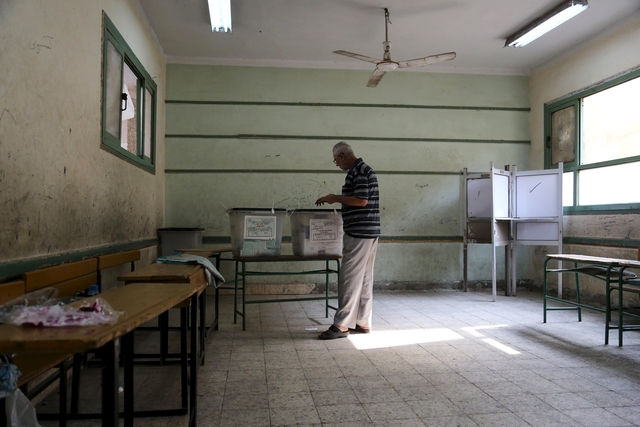Latest NEWS
- Aswat Masriya, the last word
- Roundup of Egypt's press headlines on March 15, 2017
- Roundup of Egypt's press headlines on March 14, 2017
- Former Egyptian President Hosni Mubarak to be released: lawyer
- Roundup of Egypt's press headlines on March 13, 2017
- Egypt's capital set to grow by half a million in 2017
- Egypt's wheat reserves to double with start of harvest -supply min
- Roundup of Egypt's press headlines on March 12, 2017
ANALYSIS: Why did Egyptians ignore the elections, and what next?

By Saada Abd Elkader
The low voter turnout in Egypt's parliamentary elections noted by both Western and local media, has prompted political parties to reconsider their back-up plans ahead of the second phase of voting late next month.
The first phase of voting to elect members of the House of Representatives in Egypt and abroad ended Monday, but the official results are yet to be announced by the Supreme Electoral Commission (SEC).
The low turnout rates, partisans say, were the result of several factors including that voters were unfamiliar with most candidates. Others refrained because they did not want to elect members of Mubarak's ancien regime, while youth specifically believe that the government is restricting their freedoms.
Many voters who support the Muslim Brotherhood have also largely boycott the polls since to them, participation would mean giving credence to a fundamentally illegitimate process.
The results of the first phase are due to be announced today, Wednesday, or tomorrow, SEC has said, while the second phase is slated for Nov. 21-23, which gives parties nearly a month to prepare.
The spokesman of the Free Egyptians Party, Shehab Wagih said the party is going to reorganise after the results of the first phase are out, hoping that voters will turn up.
The party is going to focus its efforts on youth who were significantly absent from the first phase.
For many young Egyptians participation took the form of poking fun at the entire process on Twitter using hashtags like "#instead_of_voting" and "#no_one_went."
Meanwhile, the Egyptian Social Democratic Party's Ihab al-Kharat, who is a candidate in the second phase of elections, said the party will resort to several other tactics to face the expected low turnout rate.
The party's candidates plan to intensify their street presence in their electoral districts and will increase their visible banners within the budget allowed by SEC.
The elections law stipulates that candidates contesting single-member constituency seats can spend up to EGP 500,000 ($63,850) on campaigning, while lists running for 15 seats can spend EGP 2.5 million (around $319,250) and lists running for 45 seats can triple the sum. However, many believe that the amounts are too low, leading to a systematic violation of the spending caps, hence leading to an unfair race for candidates with less means to finance their campaigns.
The center left party is also dedicating special effort to working with youth. Kharat said that it will form groups comprising young members to explain to youth about how a parliament will improve Egypt's image and defend their causes.
Adel Amer, the director of the Egyptian Centre for Political and Legal Studies agrees that candidates, whether running as individuals or on party lists, should boost their one-on-one interactions with voters and hammer in how "critical" it is for Egypt to have a parliament at this important political juncture.
The elections represent the final step in Egypt's "roadmap to democracy", announced by then-Defence Minister Sisi in July 2013, following the military ouster of President Mohamed Mursi, who hails from the Muslim Brotherhood, which was designated a "terrorist organization" in December 2013.
The group, whose political arm the Freedom and Justice Party, swept the 2012 parliamentary polls, has called for a boycott of the 2015 elections.
The ongoing elections mark the first electoral poll held in the absence of the Muslim Brotherhood in 30 years.










